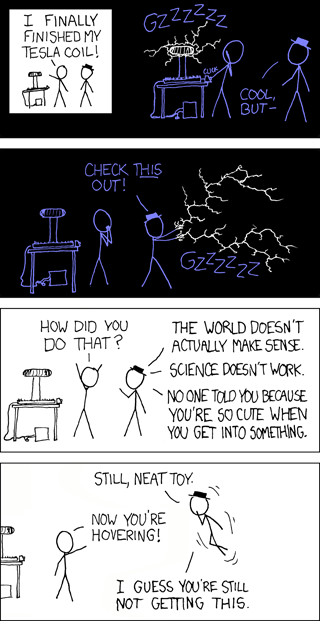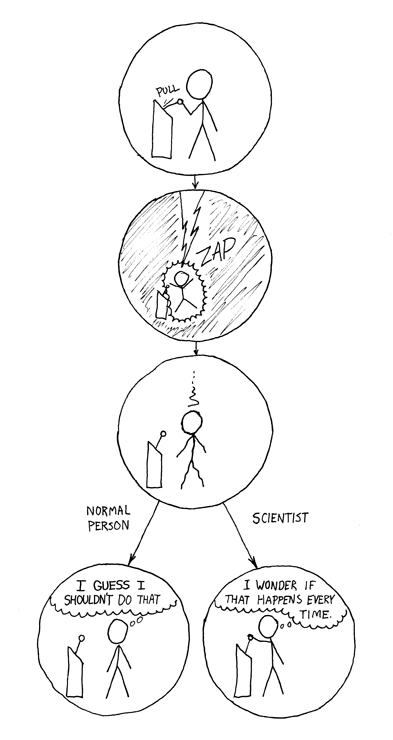I
recently saw this
and read through it briefly. Now I have not actually watched the show COSMOS myself because I am too busy with
my own vector calculus, but I would encourage all to watch it. I’m sure it’s a wonderful
show, and will promote young people to go into science. But one thing that
bothers me is some of Dr. Tyson’s wordings. Now as a humble graduate student I
fully accept that he is probably a much more intelligent person than I, and
also he has PhD in astrophysics so he is definitely not an idiot or a bad
scientist. What bothers me personally is his political agenda tied to the way
he talks about science. The nice thing about science is that we can leave the
normal politics and religion outside when we walk into the lab door. Obviously
there is politics in science, but it is very different. We argue about theories,
experiments, funding, and the likes. So I will highlight the biggest problem I
have with Dr. Tyson’s perceived agenda (perceived to me). Science cannot
replace religion, it was never meant to. When you start to mix the two bad
things happen. Like I have stated in earlier posts religion is all about a
belief system. Science is a methodology and does not have beliefs tied to it.
So while I agree Dr. Tyson really is smart and makes some wonderful points (which I fully agree with),
some of the way he words things can make me cringe a little inside.
 |
| http://xkcd.com/1322/ |
So the
real point I’m writing all of this is that Dr. Tyson told Colbert, “that’s the
good thing about science: It’s true whether you believe it or not.” Now let me
explain why this has a large cringe factor associated with it. Oxford
dictionary defines science as: “The intellectual and practical activity
encompassing the systematic study of the structure and behavior of the physical
and natural world through observation and experiment.” There is also an
alternative definition as “archaic knowledge”. Now Dr. Tyson is using the
archaic knowledge definition (I assume) in this context. This definition does
not really cover to job of a scientist. Scientists merely practice science, or
this activity of applying the scientific model to things. So calling science
(the science that scientists practice) true doesn’t really work. Science isn’t
really “true” or “not true” it is merely a method of modeling the universe. So
while I applaud Dr. Tyson’s motives I would like to re-word his phrase. The
laws of nature hold true no matter if you believe in them or not. The
scientific models we have to describe the laws of nature are quite accurate.
The nice thing about science is that you don’t have to believe the model; you
can go out and test it for yourself. However, a good scientist will use his
time and resources wisely. Therefore, he/she would be inclined to value
peer-reviewed scientific papers and attempt to expound upon the models that
have shown to be consistent with experiments and observations.
One of
the big problems we have in science classrooms is the perceived notion that
what is in your textbook is the truth. The problem with this is that what is in
all of your scientific textbooks is not “the truth” but merely the models that
have shown to be fairly accurate in describing the laws of nature. Science
doesn’t write the laws of nature, it merely models them. I feel that students
should be encouraged to doubt what is in their textbooks. There is no reason
for a student to believe it unless they can actually become a scientist themselves.
That’s why demos are so important in all science classrooms. The demonstrations
and experiments that the students participate in are the actual science of the
class. The rest of the class is really just the philosophy part of science. The
philosophy part of science is important in becoming a good scientist. The models/laws/theories/equations/postulates/whatever
you want to call them are all models based on past experiments and
observations. It would be a good thing to learn from past experiments as it
would probably take more than one lifetime just to go through and perform
experiments for every model past scientists have discovered. When Dr. Tyson
talks about how opposing viewpoints are not necessary in every scientific
debate that’s what he was getting at. The key to good science is in knowing how
to use your time and resources wisely in testing hypotheses and attempting to
create new models. I do not agree, however, that opposing viewpoints are not necessary
in every scientific debate. If you can find just one example of how your model
does not describe the behavior of nature then that model would no longer be
viewed by the scientific community as valid and would need to be either thrown
out or revised. Nothing can really be proved in science, so the way we try to
show something is a good model is by trying to disprove it. If reasonable effort
has been put in to disprove a model or a theory, and the theory/model still
held/holds true then it means it’s probably a good model. In other words we
haven’t proven the theory/model, we have only tested it. That means we should
be open-minded to the fact that perhaps our model is wrong.
Why is
being open minded important in science? A great example is the discovery of
quantum mechanics. Scientists performed experiments which exhibited behavior
which violated the laws of physics up to that point. This is why it is so
dangerous to say that science is “true” because that infers the models of
science describe exactly the laws of nature. Quantum mechanics was not accepted
by many scientists around the time it was being discovered because those
scientists were too stubborn to accept that the “laws” of nature could be
broken. Really we just discovered that although Newton modeled nature very well
on a macroscopic scale, once you are in the context of small dimensions and
high energies nature behaves differently. So instead of saying science is true,
I prefer to use phrase such as, “an electron does what an electrons does, and
it doesn’t care what you think.” I have to thank one of my professors for his
simple yet strangely elegant insight. So science needs to be open to revision.
Perhaps none of our models will work tomorrow. If that were to happen we would
have to revise all of our models and equations to match that.
Nature will do whatever it wants,
and is not bound by scientific models. We just assume that the laws of nature
will be constant in time because they have been (we suspect according to our
model and observations) for about 14 billion years. In science we make many
assumptions and approximations in our models to save us time and resources.
This is good science because it allows us to be more productive and make even
more discoveries. We may make many statements like “information does travel
faster than the speed of light”. That is because our model and observations
show that nature has and seems to still behave this way. However, if we
discovered something which did travel faster than the speed of light it would
be ignorant to not look into this discovery further. That doesn’t mean you
should accept it, only be open to the possibility. A few years ago scientists
thought they had discovered just this, but it was shown to be experimental
error. So I am of the opinion that information does not travel faster than the
speed of light, but one day I said that nothing can ever go faster than the
speed of light. One of my colleagues showed be that danger of a statement like
that. I realize now the problem with my statement and am now very careful in my
wording of scientific statements. It would most likely be a waste of time and
resources to look for something travelling faster than the speed of light, but
if something every did it would be ignorant to not look into it further.
 |
| http://xkcd.com/298/ |
So there is a link between the laws
of nature and science. The difference between the two is science is a model,
and does not give facts. It only will show the most likely patterns which will
be repeated. I say this partly tongue in cheek because our models have proven
to be so accurate that “most likely” does not give it justice. But there will
always be a better model, new discoveries, and things we as scientists have
overlooked.
 |
| http://xkcd.com/749/ |
So in closing I would just like to
say that science and religion can co-exist. In fact if your religion teaches
you to pray, and see if you receive blessings that’s technically science. You’re
testing a hypothesis, and possibly getting results. If you took that last
sentence to heart, all I can say is good like finding a way to put error bars.
I won’t wish you luck on getting published or peer reviewed. If you’ve taken it
that far for your own sake please just stop. Some people believe in claims that
may or may not fit the current scientific theories. You believe whatever you
want, but you are likely to be wasting your time if you try to use science to
prove anything in your religion which disagrees with current scientific models.
If you want to spend your time doing that that’s fine with me (and probably
most of the scientific community), but please don’t put it into our children’s
textbooks, use our research funds, or waste our time with your conversation.
All of these things are precious to us, and I think that’s the point Dr. Tyson
is trying to make. Also remember that science is also not something that you
should believe in, nor is it a belief system. I have heard from many atheists
that they have replaced religion with science. That is probably one of the most
ignorant things I have ever heard. You
can’t replace a belief system with something that is not a belief system. If
you think that scientific models disagree with the claims of religion that’s ok,
but leave the religion behind and don’t get all preachy with the science. Like
Dr. Tyson meant to say, the beauty about science is that you don’t have to
believe it. Just go try it and you’ll see for yourself if it works.
